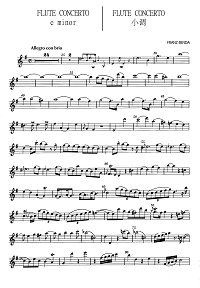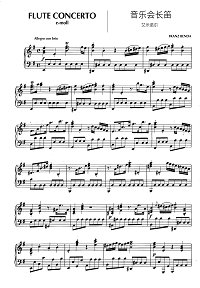Benda - Flute concerto
Benda - Flute concerto. You can download the PDF sheet music Benda - Flute concerto on this page. In the Allegro con brio of the E minor Flute Concerto (from about 1764) Benda achieves a drama with the agitated, pressing orchestral ritornello, and which recalls the furious revenge arias of Italian opera seria. In contrast to this, the soloist, in his solo passages, appears time and again to try to calm the agitated mood. Benda produces a similar contrast in the closing Presto, where a rustic ritornello taken from Bohemian folk music and the trifling courtly musical idiom of the flute solos are set against each other. The Adagio un poco Andante, set unusually with muted strings, is likewise closer to the sensitive aesthetic of C.P.E.Bach than the galant free musical doctrine of Frederick.
To download PDF, click the "Download PDF" button below the appropriate sheet music image.
To view the first page of Benda - Flute concerto click the music sheet image. |
| PDF format sheet music |
|
|
|
Flute part: 10 pages. 5309 K
|
Piano part: 30 pages. 17782 K
|
 |
 |
|
|
| Download PDF (14.99
€) |
Download PDF (14.99
€) |
|
| Benda's flute concertos are frequently associated with the flute-playing Prussian King Frederick II. However tempting the thought must be, in view of the conservative, and even quite parochial, musical taste of the monarch, it appears to be rather unlikely. Frederick II did not want any strong, dramatic or pathetic effects, but a cheerful, flattering and tender musical idiom. In addition there is the plausible statement of Johann Joachim Quantz to Charles Burney that Frederick II had only ever played concertos by him in his evening concerts. It is more likely, that they were produced for the numerous private Academies in Potsdam and Berlin, which were organised by the nobility and the wealthy bourgeoisie, and in which members of the royal orchestra took part. The flute concerto of Franz Benda must not have pleased the royal ears very much, even if Benda appeared from time to time in the flute concertos to be rather more conciliatory than his colleague. |
|